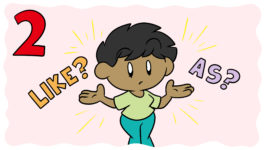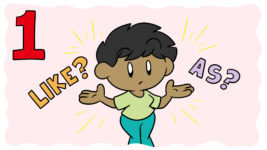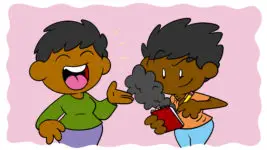Great Britain, if you haven’t heard of it, is an island in the Atlantic Ocean, just north of France. It’s very rainy, and the people who live here like to talk about how rainy it is more than perhaps any other topic. We’re consistent like that.
Despite this inauspicious description, writers and filmmakers keep finding reasons to either set their work in Britain or write British characters. The world’s interest in Britain probably has something to do with the fact that we’ve historically been rather, er, aggressive in our colonization (though you won’t learn about that in British schools!) If not that, it’s probably The Beatles’ fault.
Either way, Brits turn up in everything from American movies to Nigerian literature; sometimes with insightful accuracy, but more often with cliché, stereotype, and fantasy. Downton Abbey and Harry Potter have a lot to answer for.
This, then, is your myth-busting guide to writing British people and British culture. Get yourself a cup of tea, turn off the telly, and let’s get started.
What is Britain?
Where better place to begin than with the question of what Britain actually is? After all, how can Scotland be a country when the UK is a country? Are the UK and Great Britain the same thing? What’s the deal with Ireland?
Let me break it down. First of all, the UK is a sovereign nation which consists of four countries: England, Northern Ireland, Wales, and Scotland. ‘The British Isles’ is the name of the group of islands around Great Britain, which includes Ireland, the Isle of Man, the Isle of White, and roughly 6000 other islands. Great Britain itself is the main island that’s home to England, Scotland, and Wales. This means that when you talk about Great Britain, you’re not talking about the whole of the UK; you’re excluding Northern Ireland, Shetland, the Hebrides, and the thousands of smaller islands.
Given this convoluted union, you’d expect the distribution of political power to be confusing, and you’d be right. The national government is based in Westminster in London, but devolved governments have considerable power over legislation and policy in Scotland, Wales, and Northern Ireland. Scotland, for example, has a far more functional welfare state than England as well as its own separate judicial system.
As for Ireland, well, that’s a delicate question. Only Northern Ireland is part of the UK; the Republic of Ireland is its own separate nation. Relations, though much improved, remain fraught – after all, the Troubles, the ethno-nationalist conflict fought between Catholic Irish nationalists and British-backed Protestant unionists, only ended in 1998. 2016’s Brexit vote succeeded in rekindling tensions on the Irish border as questions of trade and movement were brought to the table.
So, if you’re writing about Britain, make sure you use the correct term for the correct sovereign state/island/country, and be aware of how power is brokered. If you’ve got the queen marching in to seize power in Westminster, the collective groan from Britain will reach you no matter where you’re hiding – in fact, she’s not even allowed to enter the House of Commons.
The British accent
What many love to call ‘the British accent’ – that is, the accent of Stephen Fry, Benedict Cumberbatch, and Ian McKellen – is in fact one British accent among literally hundreds. Known as ‘Received Pronunciation,’ it’s as much a British accent as Cockney, or Brummie, or Scouse, or Valleys, or Glaswegian, or Cornish. There are British accents that make the English language unrecognizable to most English people, let alone to American Midwesterners.
So, if you’re not from Britain and you want to write a British character, don’t assume they sound like Hugh Grant, Margaret Thatcher, or Judi Dench; in reality, it’s an accent that tends to communicate a very specific overlap of class and geography.
There are dozens of YouTube videos showcasing some of the stranger British accents, but here’s a fun one that goes through seventeen (a very small sample!) in around five minutes.
Slang
Every nation has its own slang, and the UK is no exception. Indeed, we have a huge variety of colloquialisms and obscenities that vary by region and that can add a great sense of local color to your fiction.
There are the classics you’re probably already aware of – ‘blimey,’ ‘bloody hell,’ ‘bloke,’ ‘wanker,’ – but there are plenty of more colorful, less London-centric terms too: ‘radged’ is a Scottish and north-eastern English term for ‘crazy’, while if you were a cruel southwestern English schoolchild you’d call your ugly classmate a ‘munter.’ Additionally, different ethnic groups, age groups, and classes will have their own distinct slang terms, all of which remain quintessentially British; a working-class Brit would never sincerely call someone a ‘pleb,’ while the upper classes are unlikely to have ever accused anyone of being a ‘sket.’ There are also a few words that, while still offensive in the UK, are a good deal more offensive than when used across the pond.
Of course, it’s not all cursing. Depending on which part of the country you’re from, you’ll insist a bread roll is either a cob, a barm, a bun, a barm cake, a bap, a batch, or a teacake. It’s madness over here.
The point is, British slang goes well beyond Cockney rhyming slang, so make sure you do your research, both in terms of vocabulary and phrasing. ‘Right,’ for example, is a common intensifier in British speech, but it’s not all-purpose – a Brit might say ‘you’re a right git’ but they’d never say ‘you right git.’
Size
The UK, especially compared to the USA, is very small; you can drive from top to bottom in about ten hours (I hear it takes that long to drive across Florida). However, we’re incredibly densely populated – 66 million people live here, with some 9 million in the capital alone. This means we’re not quite as small, quaint, and village-like as you might assume; and no, we certainly don’t know your British grandmother.
Because of these different notions of distance, public transport plays a more central role in British life. This means that we’re less likely to hop in the car for a six-hour drive; instead, we’ll take the train. This means a ‘Great British Roadtrip’ novel is likely to raise some eyebrows; there’s very little romance to be found sitting in traffic on the M6.
Brands and products
One of the things many of my American friends found startling when they moved to Britain was the sudden lack of familiar brands. We don’t have Twinkies here, friend; we don’t have Chick-fil-A, or Wendy’s, or Pop Tarts, or root beer, and there’s exactly one Hooters in the whole of the UK. Sometimes, we’ll have the equivalent by a different name, but surprisingly often, we’re just into different things – you’d struggle to find any of the entries on the preceding list outside a foreign foods aisle in your local supermarket.
What we do have is a lot of American television, so the average Brit is familiar with all of the above, making it all the more glaringly inauthentic when a character who’s supposed to be in Manchester pops into a Walmart rather than a Tesco.
The royal family
While they’re popular abroad, most Brits really don’t pay much attention to the royal family. They’re basically tabloid filler, only entering national news when one of them gets married or when some political event necessitates the queen’s involvement – as, while the queen has no actual political power, British law is full of silly rituals that demand the monarch’s formal assent. This tends to mean that events which merit international coverage come with a soundbite from the queen, giving a somewhat warped impression of her presence in everyday British life.
While the British are divided over whether we should even have a royal family, few are interested enough to actually learn the royal lineage or even to argue much about the right of king/queenship. In 2020, the royals are essentially tourist attractions, and they tend to exist even outside our conception of patriotism – shouting ‘God save the queen!’ in your local pub is more likely to invite an embarrassed silence than a round of applause.
Food
The riddle of why British food gets such a bad rap is actually pretty simple. In the 1950s and ’60s, an influx of Chinese, Indian, and Caribbean immigrants changed British food culture to such an extent that these diverse cuisines are now considered just as British as fish and chips, with foods like chow mein, tikka masala, and curried goat being national staples. There’s even a football chant about vindaloo (by Fat Les, a… national treasure.)
Don’t get me wrong – traditional English foods such as pies, sausages, Yorkshire puddings, and roast dinners are good grub but, as a nation, we’ve embraced a range of foods which may not appear identifiably ‘British’ from an overseas perspective, even as many of them have grown distinct from the traditions that birthed them. While it’s fine to depict the idea that British food is seen as bland and boring by other nations, stories set within Britain should appreciate that British cuisine describes a far wider range of foods than you might assume from the outside.
But yes, we do drink an awful lot of tea. That one’s true.
Teeth
One of the fun things about imbibing other cultures is finding out the weird stereotypes they have about you that you’ve never encountered in your own country. For many Brits, that The Simpsons episode with ‘The Big Book of British Smiles’ was our first inkling that British dentistry was apparently an object of ridicule.
Happily, this is more of an American prejudice than a worldwide assumption. Americans didn’t start brushing their teeth until a marketing genius named Claude C. Hopkins single-handedly convinced them to, earning millions for Pepsodent in the process. Hollywood jumped on this new trend and, in the 1920s, Hollywood stars were having their teeth straightened, bleached, and carefully polished, which then became the exported American image. Our film stars, meanwhile, missed this American memo – some had teeth missing, and those that didn’t had normal, vaguely crooked, slightly yellowing smiles. Thus began the idea that Brits have especially bad dental care.
But here’s the thing: British teeth are among the healthiest in the world. Studies have shown that we top OECD nations in terms of healthy teeth, and Ben Atkins, a trustee of the Oral Health Foundation, explains how ‘A recent joint study [between University of London and Harvard] showed the average American person was missing 7.31 teeth compared to 6.97 in Britain, which is significantly higher.’ It comes down to access. In Britain, dental care is free for all children and heavily subsidized for all adults under the NHS.
Towns and cities
While I wish all British towns and cities looked like rugged castles or quaint medieval villages, that just isn’t the case. Yes, we do have plenty of quaint Hot Fuzz-esque villages, but our towns and cities tend to disappoint visitors due to the fact that a lot of the historical buildings were bombed to smithereens in WW2.
Cities that were probably once rather picturesque in that stark, Victorian way, like Hull, Southampton, and Coventry, were reduced to rubble, and the government had very little money with which to rebuild after the war was over. As such, there are an awful lot of grim, cheap, boxy buildings that were thrown up ‘temporarily’ in the ’50s and ’60s and then never demolished.
Of course, there are a few exceptions: Edinburgh, the capital of Scotland, will delight anyone who thinks the UK is basically Hogwarts, and York is very much a ‘ye olde towne.’ Even London has a few historic spots left.
Service culture and alcohol
If you’re American, you’re probably used to aggressively friendly service staff introducing themselves, holding you close, and asking if you’ll be the godparent to their firstborn. They’re fishing for tips, sure, but they’re also meeting expectations; American culture demands friendly service staff!
Here, that’s not the case. British minimum wage laws apply to service staff, meaning firstly that staff are far less friendly (and thank heavens for that – in British culture, being overly friendly to strangers is considered rather rude) and secondly that tipping culture is far less of a thing.
Yes, we’ll tip at restaurants and sometimes in cafes, but the norm is between 10 and 15 percent. As for pubs and bars, there’s certainly not an expectation to tip with every drink; rather, it’ll be a ‘keep the change’ situation, or else you’ll ask the barperson whether they fancy a drink. Of course, if you’re in a fancy cocktail bar where the staff are cartwheeling while making martinis, it’s a different story – where someone goes the extra mile, tipping is very much expected, and it’s a point of pride when making purchases abroad.
Rounds are a thing here too. This is where you take turns to go to the bar, buy drinks for everyone, and return to the table juggling a dozen full pint glasses, generally rotating until everyone has bought everyone a drink (though no-one’s officially keeping count.) Table service isn’t a thing in pubs, and we drink by the pint rather than by the bottle. Local beers are common, but we also love our European lagers and, these days, American-style IPAs.
The big stuff
Larger differences invite contention, but suffice to say that the BBC and NHS are huge aspects of British life. The former – the British Broadcasting Corporation – is a public service broadcaster funded principally by an annual television license fee paid by almost everyone in the UK. While seldom perfect, the intent is that the BBC is free of commercial interests and immediate political influence, and can therefore act as an unbiased force for the public good (bolstered by regulations intended to balance political coverage and define necessary areas of focus.)
The National Health Service is the publicly funded healthcare system of the UK, paid for through general taxation. The NHS was founded on the principles of providing a service that is ‘comprehensive, universal and free at the point of delivery.’ While private healthcare providers exist in the UK, the NHS is the default option for most Brits and has a massive cultural presence.
While the BBC and NHS are constant subjects of political discussion, and there are plenty of Brits who would like to abolish both, the two enterprises tend to be regarded with affection. Mainstream discussions about the NHS in particular usually revolve around how to improve, rather than abolish or replace, the service, and public displays of appreciation are common, especially at time of writing.
Finally, guns. Except for the very worst parts of the biggest cities, guns don’t really figure in British culture. It’s almost unheard of for the average citizen to possess a firearm, gun crime is rare, and discussion of gun rights is basically non-existent.
Bob’s your uncle, Fanny’s your aunt
There it is, then; a short guide to getting Brits and the UK right in your fiction. Obviously, I couldn’t hope to catalog every cultural difference between the UK and US here – you’d need a series of books for that – but this post will hopefully act as a good starting point for your research while busting a few myths you may have been hanging onto.
Of course, a good way to learn more about the UK is to visit! But, as COVID-19 has put paid to that, try reading some British authors instead: among our best are Zadie Smith, Martin Amis, and Ali Smith. Enjoy.
What surprised you about the UK? Anything glaring I missed out? Let me know in the comments, and check out When Can You Include Accent And Dialect In Your Dialogue? and How To Make The Most Of Your Research Trip for more on writing about unfamiliar cultures.





